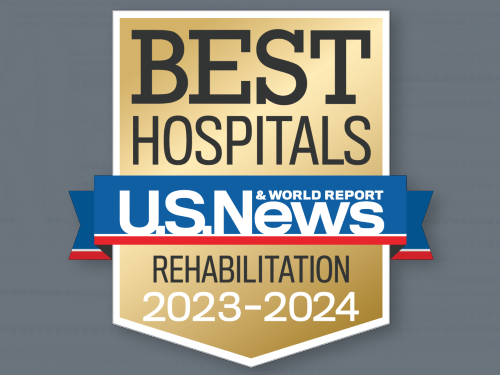
Oakes quickly regained his speech and was transported by air ambulance to St. Luke’s Episcopal Hospital in the Texas Medical Center for observation. “I met him in intensive care with a change of clothes and sneakers, assuming the worst was over,” his wife recalls. “But by the time I arrived, his speech had begun to slur again.” The stroke left him with a large basilar artery thrombosis in the brainstem, which is associated with a very poor prognosis.
Oakes was in surgery for three hours. He spent over a week in intensive care battling pneumonia while his care team worked to reduce swelling in his brain. “Barry could move his head and feet a little, blink his eyes and squeeze my hand every so often,” Nicole Oakes says. “He was in and out of consciousness and on a ventilator. The doctors told me we had a long road ahead and advised me not to expect too much. They could tell Barry was a fighter and encouraged me to be patient. Ultimately, they said the first three months would be critical in determining the prospects for and extent of his recovery.”
A week after the stroke, she learned she was pregnant. Assuming her husband would be unable to return to his management position at ConocoPhillips, she pursued short- and long-term disability under his health plan.
Although Oakes could barely move, his cognitive ability was unimpaired. Once he could hold a marker, he communicated using a white board. In October, he transitioned from St. Luke’s to a local long-term care facility, where he worked with physical, occupational and speech therapists several hours daily. In the evenings, he and his wife continued the work together.
“Our goal was always to get to TIRR Memorial Hermann,” Nicole Oakes says. “We were unfamiliar with the hospital, but family, friends and doctors at St. Luke’s described it as the place where miracles happen.” Oakes was admitted to TIRR Memorial Hermann on November 2, 2010, under the care of attending physiatrist Luz Tastard, MD.
“My biggest challenge at the beginning was not being able to swallow,” Oakes recalls. “I laid in bed watching TV commercials about sodas and couldn’t wait to have one.” By the time he went home on December 4, 2010, he was drinking thick liquids and eating chopped food.
He remembers his first day at TIRR Memorial Hermann. “They start by asking you what your goals are. I’m a very goal-oriented person, so this approach worked well for me. We had moved into a new home just two weeks before my stroke. One of my goals was to be able to walk upstairs to the media room. So on my first day of physical therapy, my therapist said, ‘Okay, let’s go climb some stairs.’” With assistance, he climbed 10 steps, and never looked back.
Oakes left the hospital with a wheelchair and a walker, but he never again used the wheelchair. “It’s amazing how positive and intense the staff was about helping him improve,” Nicole Oakes says. “We’re forever indebted to the dedication of the staff at TIRR Memorial Hermann. You very quickly get the feeling that you’re part of a big family.”
In June 2011, Oakes returned to work fulltime at ConocoPhillips, where he manages the Unites States refinery supply. Today, he leads conference calls and travels at least once a month for business. In his free time, he works out at the gym, jogs, plays golf and spends time with his wife, his two sons, Sean and Ryan, and his new twin daughters, Stella and Maddie, who were born on May 12, 2011. In March 2012, he finished the Memorial Hermann Sugar Land Hospital half marathon.
In April 2012, he underwent the first of three ablations to repair the atrial fibrillation, diagnosed in his late 20s, which physicians believed caused his stroke. “I would like to thank my therapists for their tireless dedication to pushing me to new heights – a day at a time,” he says. “My life and goals changed after the stroke, but with the help I received at TIRR Memorial Hermann and the support of my family, I’ve achieved more than anyone ever dreamed possible.”
Contact Us
If you have questions or are looking for more information, please complete the form below and we will contact you.

Nationally Ranked Rehabilitation
For the 34th consecutive year, TIRR Memorial Hermann is recognized as the best rehabilitation hospital in Texas and No. 4 in the nation according to U.S. News and World Report's "Best Rehabilitation Hospitals" in America.
Learn More